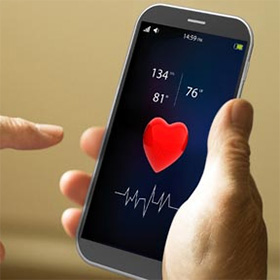Recent Stories
- Businesses urged to tap into science and technology young talent
- Digital relay baton enables remote crowd cheering of athletes
- Health Innovation Campus moves a step closer
- £7.1 million R&D boost for North West businesses
- Centre of excellence created for the next industrial revolution
- Artificial intelligence toolkit spots new child sexual abuse media online
- Strategic partnership set to help plug cyber security skills gap
- What your choice of smartphone says about you
- InfoLabTree: Discover the Story
- novi.digital Launch Event - 'An Event to Help Businesses Grow Online'
RSS Feeds
RSS feeds can deliver the latest InfoLab21 news and events direct to your browser without you having to visit the website.
In most browsers you can click on an RSS link and choose to subscribe to the feed to add it to your favourites or bookmarks.
Researchers urge caution on wearable health devices

Wearable devices to monitor health are not always reliable or secure according to research.
The market for digital devices like smartwatches and fitness bands is growing, with 19 million likely to be sold worldwide this year. They can measure everything from heart rate to physical activity, temperature and even mental wellbeing.
But research by Lancaster University, the University of the West of England and Nottingham Trent into the rise of consumer health wearables cautions against overenthusiasm.
The researchers said: “Devices are marketed under the premise that they will help improve general health and fitness, but the majority of manufacturers provide no empirical evidence to support the effectiveness of their products.”
Around a third of users stop wearing these devices after six months, and half after one year. Evidence for the effectiveness of these devices is anecdotal and there is little scientific evidence as to how they improve health.
While consumer wearables could be more useful for patients with conditions like diabetes or cardiac problems, current solutions are still in the early stages of development.
Dr David Ellis of Lancaster University said: “For chronic conditions, wearables could effortlessly provide detailed longitudinal data that monitors patients’ progress without the need to involve more sophisticated, uncomfortable and expensive alternatives. For instance, it is possible to identify the severity of depressive symptoms based on the number of conversations amount of physical activity and sleep duration using a wearable wristband and smartphone app.”
But although the use of pedometers is linked to an increase in physical activity and a decrease in blood pressure, there is no evidence of long term change.
The researchers said: “The reliability and validity of wearable devices is also concerning. Recent comparisons between various wearables for tracking physical activity showed large variations in accuracy between different devices – with error margins of up to 25%.”
In addition, personal data generated by the device is collected and stored by the manufacturer, not the user, and sometimes sold on to third parties, while digital traces of behaviour like location and time can be used to reveal the user’s identity.
The researchers say that devices need to be validated and standardised to ensure that wearable technology becomes an asset for healthcare in the 21st century.
Tue 09 February 2016



